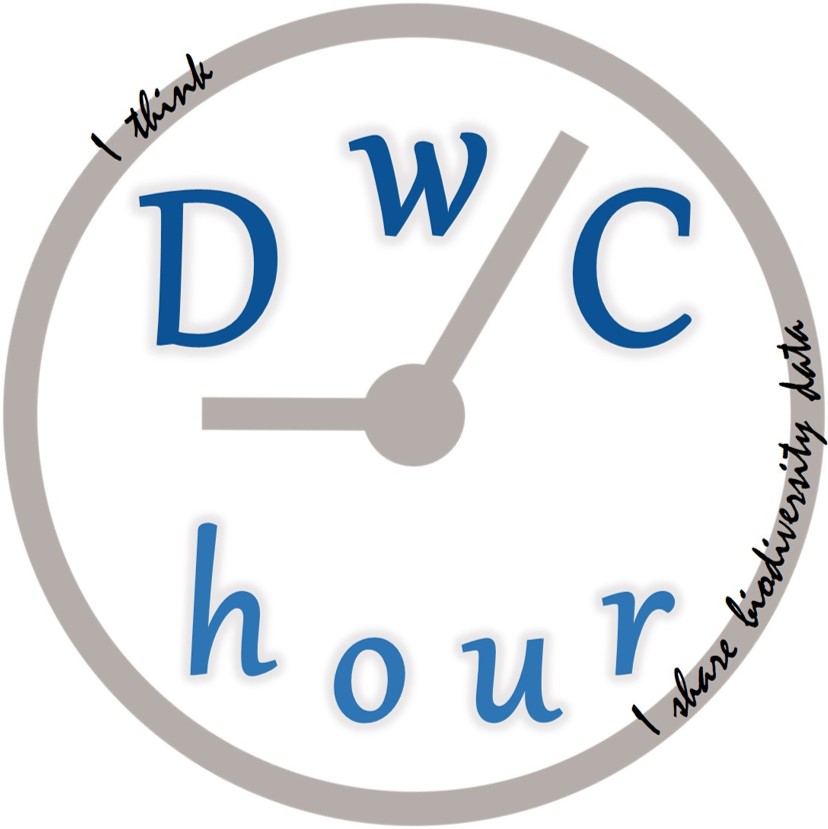 UPDATE: link to recordings for Darwin Core Hour #4
UPDATE: link to recordings for Darwin Core Hour #4
Darwin Core Hour #4 (mp4)
Darwin Core Hour #4 (Adobe Connect version)
When: Tuesday 2 May 2017 5 PM CEST, 11 AM EDT, 10 AM CDT, 3 PM UTC
Where: https://idigbio.adobeconnect.com/room lots of "room" here, up to 500 people - see you soon!
Please expect this DwC Hour to be 1.5 hours.
We encourage people to bring or submit questions and to have open discussions in each webinar.
Abstract - Chapter 4:
Darwin Core Hour #4 shifts focus to understanding how the DwC standard terms and extensions evolve. Community input and implementation drive development of DwC. For this webinar, we selected dwc:preparations, dwc:occurrenceStatus, and dwc:establishmentMeans to show how the process works and highlight the need for outside input. Two presenters, Andrew Bentley and Quentin Groom, invite you to join them and bring your expertise and insights to current issues surrounding these terms. Introduction by John Wieczorek.
Chapter 4, Part 1. The Need for a Darwin Core preparation extension
Presenter Andrew Bentley, Ichthyology Collections Manager and Specify Software Usability lead, starts with an overview of the data now being shared using the dwc:preparations term. From aggregators' datasets, we can look inside and see the need for a preparations extension to Darwin Core rather than just one term. As Andy writes, the preparation field in Darwin Core is fraught with inconsistency. A quick review of the field in GBIF indicates over 120,000 individual terms. This is largely due to data providers sharing information about every preparation (skin, skeleton, tissue, etc.), preparation method (cleared, dried, stained), storage medium (in alcohol, forma, etc.), and multiple preparation locations and counts for a given specimen, in one field, dwc:preparations. As such, a preparation extension is being proposed that will allow for the mapping of multiple preparations, the separation of the multiple concepts and the addition of valuable additional fields of information to describe each preparation. Input from the community is sought to gauge interest in such an extension, to outline the necessary fields to be included, and incoporate the relevant work already done such as that of Apple Core (see reading materials).
Chapter 4, Part 2. Improving Darwin Core for Invasive Species Research
Presenter Quentin Groom, at the Botanic Garden Meise, is a Data Scientist with an interest in invasive species. Quentin writes, biological invasions are an issue for species conservation and cause a wide-range of socio-economic problems. Within the community of invasive species scientists it is widely recognized that rapid, early action and integrated policies are needed to prevent, or at least slow, invasions. Towards this goal the community has proposed various data standards for specific data elements related to biological invasions. Moreover, numerous databases of invasive species incorporate bespoke terminologies. In discussions with invasive species experts four data types have been identified of particular interest. These are firstly an expression as to whether an organism is native to the place it was found. Secondly, an expression as to whether the organism exists at the location (or is extinct or absent). Thirdly, an expression about how the organism got to the location (e.g. planted) and finally, an expression of how well established the organism is. Currently, there is little guidance on how to express these concepts in Darwin Core and in some cases there is no method. In this presentation I will discuss how we can build consensus about terms and controlled vocabularies in a community. I will present current Darwin Core extensions for invasive species, but also issues related to core Darwin Core terms and how they could be improved. Lastly, I will mention why it is worth making the effort and what these improvements will enable us to do.
Presenters: Andrew Bentley and Quentin Groom
Moderators: Gary Motz, John Wieczorek, and Deborah Paul
Darwin Core Hour Series Abstract:
Darwin Core has become a broadly-used standard for biodiversity data sharing since its inception as a standard by the organization Biodiversity Information Standards (TDWG) in 2009. Despite, or because of, its popularity, people trying to use the standard continue to have questions about how to use Darwin Core and associated extensions. This webinar series looks at open questions related to Darwin Core. Though the topic is broad, individual chapters in the series will focus on specific topics to any adequate level of depth. We encourage people to bring or submit questions and to have open discussions in each webinar.
Relevant pre-reading materials and Links.
IAS DwC proposal: A proposal to TDWG to improve the Darwin Core Standard for the use in invasive species management and for red-listing of species. https://github.com/qgroom/ias-dwc-proposal
Blackburn TM, Pyšek P, Bacher S, Carlton JT, Duncan RP, Jarošík V, et al. A proposed unified framework for biological invasions. Trends in Ecology & Evolution (2011) 26:333-339.
Blackburn TM, Essl F, Evans T, Hulme PE, Jeschke JM, Kühn I, et al. A unified classification of alien species based on the magnitude of their environmental impacts. PLoS Biol. (2014) 12:1-11. doi:10.1371/journal.pbio.1001850
Hulme PE, Bacher S, Kenis M, Klotz S, Kuhn I, Minchin D, et al. Grasping at the routes of biological invasions: a framework for integrating pathways into policy. Journal of Applied Ecology (2008) 45:403-14.
Macklin, J.A., Desmet, P., and Sweeney, P. (2011). "Apple Core: Darwin Core guidelines for herbaria.", Biodiversity Information Standards (TDWG) Annual Conference 2011, Astor Crown Plaza Hotel, New Orleans, LA, USA, October 16-21, 2011.
http://rs.tdwg.org/dwc/
http://rs.tdwg.org/dwc/terms/
https://github.com/tdwg/dwc-qa/wiki
Darwin Core Hour Webinars, Q & A too!
Link to how to get the most out of Adobe Connect https://www.idigbio.org/wiki/index.php/Web_Conferencing
Please use headsets for best experience.




